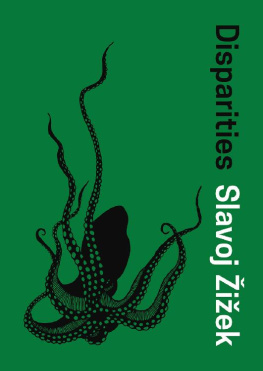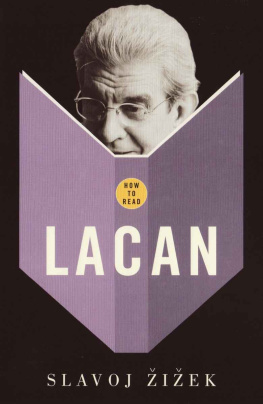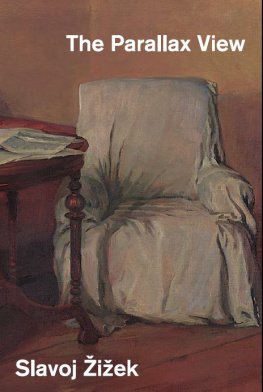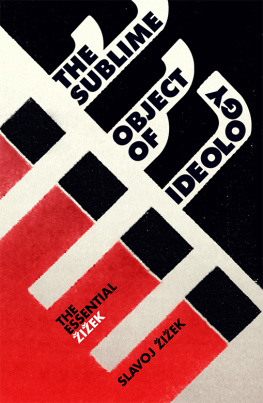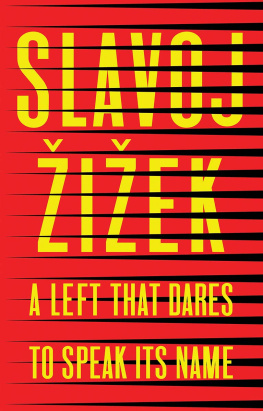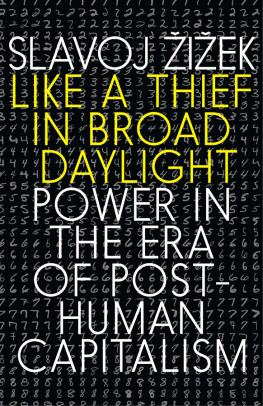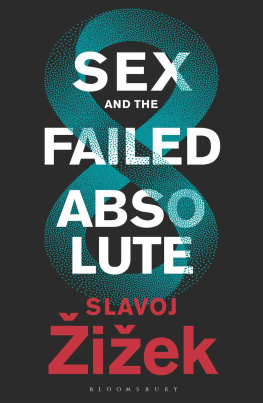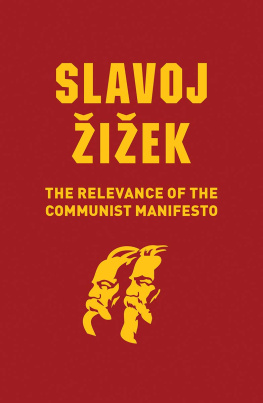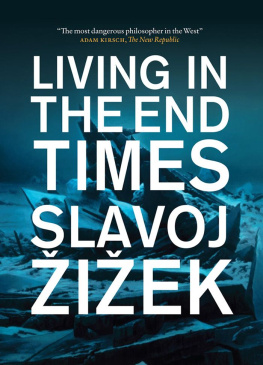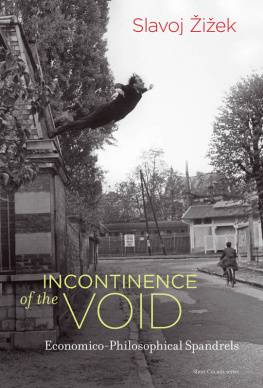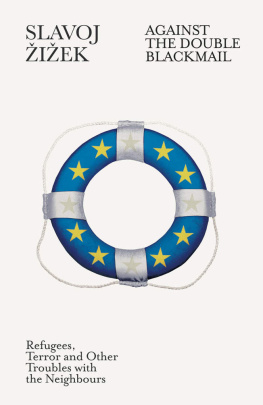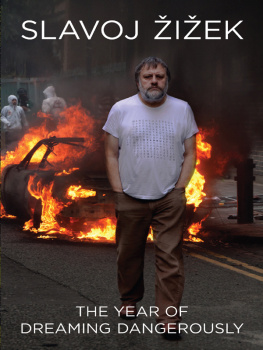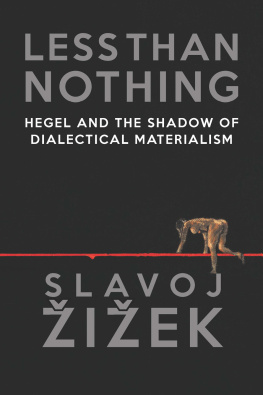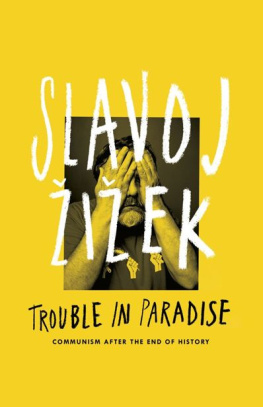Slavoj iek
THE COURAGE OF HOPELESSNESS
Chronicles of a Year of Acting Dangerously
Contents
For Jela, just like that, for no reason at all
Introduction:
V for Vendetta, Part 2
In a wonderful comment on Italo Svevos novel Zenos Conscience, Alenka Zupani deploys a systematic matrix of the relations between repetition and ending. The basic version is the false reference to the freedom of choice where (if we take the case of smoking) my awareness that I can stop smoking any time I want guarantees that I will never actually do it the possibility of stopping smoking is what blocks the actual change; it allows me to accept our continuous smoking without bad conscience, so that the end of smoking is constantly present as the very source of its continuation. (As Zupani perspicaciously notes, we should just imagine a situation in which the subject is under the sway of the following order: you can smoke or not, but once you start to smoke you have no choice, you are not allowed to end. Far fewer people would choose to smoke under this condition.) When I can no longer tolerate the hypocrisy of this endless excuse, the next step consists in an immanent reversal of this stance: I decide to smoke and I proclaim this to be the last cigarette in my life, so I enjoy smoking it with a special surplus provided by the awareness that this is my last cigarette and I do this again and again, endlessly repeating the end, the last cigarette. The problem with this solution is that it only works (i.e., the surplus-enjoyment is only generated) if, each time that I proclaim this to be my last cigarette, I sincerely believe it is my last cigarette, so this strategy also breaks down. In Svevos novel, the next step is that the subjects analyst (who, till now, has tried to convince Zeno that smoking is dangerous for his physical and mental health) changes his strategy and claims that Zeno should smoke as much as he wants since health is not really a problem the only pathological feature is Zenos obsession with smoking, his passion to stop doing it.
So what should be brought to an end is not smoking but the very attempt to smoke. Predictably (for anyone with analytic experience), the effect of this change is catastrophic: instead of finally feeling relieved and able to smoke (or not) without guilt, Zeno is totally perturbed and desperate. He smokes like crazy and nonetheless feels totally guilty, without getting any narcissistic satisfaction from this guilt. In despair, he breaks down. Whatever he does turns out to be wrong: neither prohibitions nor permissiveness work, there is no way out, no pleasurable compromise; and, since smoking has been the focus of his life, even smoking loses its sense, there is no point in it. So, in total despair not as a great decision he stops smoking The way out thus emerges unexpectedly when Zeno accepts the total hopelessness of his predicament. And this same matrix should also be applied to the prospect of radical change. The predominant attitude among academic radical Leftists is still the one that, back in 1937, George Orwell described apropos class difference:
We all rail against class-distinctions, but very few people seriously want to abolish them. Here you come upon the important fact that every revolutionary opinion draws part of its strength from a secret conviction that nothing can be changed.
Orwells point is that radicals invoke the need for revolutionary change as a kind of superstitious token that should achieve the opposite, i.e. prevent the change from really occurring like todays academic Leftist who criticizes capitalist cultural imperialism but is in reality horrified at the idea that his field of study might really become redundant. The stance is here the same as that of the smoker convinced that he can stop smoking if he chooses to do so: the possibility of change is evoked to guarantee that it will not be acted upon. Then we get an entire panoply of strategies that amount to the same thing, up to accelerationism (capitalism will collapse through its overdevelopment, so lets engage in it to the end ). It is only when we despair and dont know any more what to do that change can be enacted we have to go through this zero point of hopelessness. In short, we have to enact in politics a reversal similar to the one enacted in Der Leiermann, the song that concludes Schuberts Winterreise. It appears to describe the utter despair of the abandoned lover who finally loses all hope, even the very ability to mourn and to despair, and conjures the man on the street playing his hurdy-gurdy. However, as many commentators have noticed, this last song can also be read as a sign of forthcoming redemption: while all the other songs in the cycle present the heros inward brooding, here, for the first time, the hero turns outwards and establishes a minimal contact, an emphatic identification, with another human being, although this identification is with another desperate loser who has lost even his ability to mourn and is reduced to performing blind mechanical gestures. Two years before his death, when it became clear that there would be no all-European revolution, and knowing that the idea of building socialism in one country was nonsense, Lenin reached this point when he wrote:
What if the complete hopelessness of the situation, by stimulating the efforts of the workers and peasants tenfold, offered us the opportunity to create the fundamental requisites of civilization in a different way from that of the West European countries?
The basic ideological operation of Stalin was precisely to turn around Lenins reading of the situation: he presented the Soviet Unions isolation as a unique chance to build socialism in one country. In that historical situation, Stalins formula was one of hope. However, the next decade made evident the price paid for the attempt to live up to this hope: purges, mass starvation, etc. The lesson of twentieth-century communism is that we have to gather the strength to fully assume the hopelessness. Giorgio Agamben said in an interview that thought is the courage of hopelessness an insight which is especially pertinent for our historical moment, when even the most pessimistic diagnosis as a rule finishes with an uplifting hint at some version of the proverbial light at the end of the tunnel. The true courage is not to imagine an alternative, but to accept the consequences of the fact that there is no clearly discernible alternative: the dream of an alternative is a sign of theoretical cowardice, functioning as a fetish that prevents us from thinking through to the end the deadlock of our predicament. In short, the true courage is to admit that the light at the end of the tunnel is probably the headlight of another train approaching us from the opposite direction.
This approaching train has lately assumed many forms. In the last few years, troubles in our global-capitalist paradise have exploded at four levels, with four figures of the enemy: the renewed fundamentalist-terrorist threat (the declaration of war against ISIS, Boko Haram ); geo-political tensions with and between non-European new powers (China and especially Russia); the rise of new radical emancipatory movements in Europe (Greece and Spain, for the time being); the flow of refugees crossing the Wall that separates Us from Them, thereby posing a threat to our way of life. It is crucial to see these threats in their interconnection not in the sense that they are the four faces of the same enemy, but in the sense that they express aspects of the same immanent contradiction of global capitalism. Although fundamentalism and the flow of refugees appear as the most threatening of the four (is ISIS not a brutal denial of our civilized values?), the tensions with Russia pose a much more serious danger to peace in Europe, while movements like Syriza prior to its capitulation undermine from within global capitalism in its neo-liberal version. But there should be no misunderstanding here: Western powers can easily co-exist with fundamentalist regimes; while in the case of Putin, the problem is how to contain Russia in geo-political terms (recall that his rise is the result of the catastrophic Yeltsin years marked by corruption, the years when Western economic advisors helped to humiliate Russia and to bring it to ruin). So although the US formally declared war on ISIS, and although there is constant talk about the threat of a war with Russia, the true danger are the moderate and gentle new emancipatory movements from Syriza in Greece to the followers of Bernie Sanders in the US, and their putative radicalization. Because of this misperception of radical politics, we live in times of pseudo-conflicts: in the UK, Brexit yes or no, in Turkey the military or Erdogan, in Eastern Europe, new Baltic-Polish-Ukrainian fundamentalists or Putin, in France, burkini or bared breasts, in Syria, Assad or Daesh In all these cases, although one might slightly prefer one side to the other, the ultimate stance should be one of indifference, best rendered by Stalin who, when asked in the late 1920s which deviation is worse, the Right one or the Leftist one, snapped back: They are both worse! Is there still the potential for true change beneath these pseudo-struggles? There is, since the function of these pseudo-struggles is precisely to block the explosion of the true ones.


